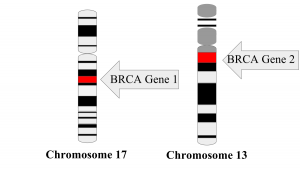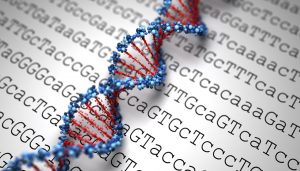What is genetic testing?
Genetic testing is the use of medical tests to look for changes(mutations) in a person’s genes. The changes in genes or mutations play an important role in the development of cancer. They can cause cells to grow out of control which can lead to cancer. According to National Cancer Institute, inherited mutations are thought to play a role in about 5 to 10 percent of all cancers.
What genetic tests are available for cancer risk?
More than 50 hereditary cancer syndromes have been identified. The list below includes some of the more common inherited cancer syndromes for which genetic testing is available.
Hereditary breast cancer and ovarian cancer syndrome

Genes: BRCA1, BRCA2
Related cancer types: Female breast, ovarian, and other cancers, including prostate, pancreatic, and male breast cancer
Li-Fraumeni syndrome
Gene: TP53
Related cancer types: Breast cancer, soft tissue sarcoma, osteosarcoma (bone cancer), leukemia, brain tumors, adrenocortical carcinoma (cancer of the adrenal glands), and other cancers
Cowden synd
rome (PTEN hamartoma tumor syndrome)
Gene: PTEN
Related cancer types: Breast, thyroid, endometrial (uterine lining), and other cancers
Lynch syndrome (hereditary nonpolyposis colorectal cancer)
Genes: MSH2, MLH1,
MSH6, PMS2, EPCAM
Related cancer types: Colorectal, endometrial, ovarian, renal pelvis, pancreatic, small intestine, liver and biliary tract, stomach, brain, and breast cancers
 Familial adenomatous polyposis
Familial adenomatous polyposis
Gene: APC
Related cancer types: Colorectal cancer, multiple non-malignant colon polyps, and both non-cancerous (benign) and cancerous tumors in the small intestine, brain, stomach, bone, skin, and other tissues
Retinoblastoma
Gene: RB1
Related cancer types: Eye cancer (cancer of the retina), pinealoma (cancer of the pineal gland), osteosarcoma, melanoma, and soft tissue sarcoma
Multiple endocrine neoplasia type 1 (Wermer syndrome)
Gene: MEN1
Related cancer types: Pancreatic endocrine tumors and (usually benign) parathyroid and pituitary gland tumors
Multiple endocrine neoplasia type 2
Gene: RET
Related cancer types: Medullary thyroid cancer and pheochromocytoma (benign adrenal gland tumor)
Von Hippel-Lindau syndrome
Gene: VHL
Related cancer types: Kidney cancer and multiple noncancerous tumors, including pheochromocytoma
How is genetic testing done?
Genetic tests are usually requested by a person’s doctor or other health care provider. The testing is usually done on a small blood sample. The sample is then sent to a genetic testing laboratory. The test results normally take several weeks.
What are the reasons to consider genetic testing for cancer?
Genetic testing is a personal decision made for various reasons. And it’s a complex decision best made in collaboration. Engage your family, doctor, and genetic counselor in the process.
ASCO recommends considering genetic testing in the following situations:
1. A personal or family history suggests a genetic cause of cancer.
2. A test will clearly show a specific genetic change.
3. The results will help with diagnosis or management of a condition. For example, you may take steps to lower your risk. Steps may include surgery, medication, frequent screening, or lifestyle changes.
Resources
https://www.cancer.net/navigating-cancer-care/cancer-basics/genetics/genetic-testing-cancer-risk
https://www.cancer.org/cancer/cancer-causes/genetics/understanding-genetic-testing-for-cancer.html
https://www.cancer.gov/about-cancer/causes-prevention/genetics/genetic-testing-fact-sheet
 Genes: BRCA1, BRCA2
Related cancer types: Female breast, ovarian, and other cancers, including prostate, pancreatic, and male breast cancer
Li-Fraumeni syndrome
Gene: TP53
Related cancer types: Breast cancer, soft tissue sarcoma, osteosarcoma (bone cancer), leukemia, brain tumors, adrenocortical carcinoma (cancer of the adrenal glands), and other cancers
Cowden synd
rome (PTEN hamartoma tumor syndrome)
Gene: PTEN
Related cancer types: Breast, thyroid, endometrial (uterine lining), and other cancers
Lynch syndrome (hereditary nonpolyposis colorectal cancer)
Genes: MSH2, MLH1,
MSH6, PMS2, EPCAM
Related cancer types: Colorectal, endometrial, ovarian, renal pelvis, pancreatic, small intestine, liver and biliary tract, stomach, brain, and breast cancers
Genes: BRCA1, BRCA2
Related cancer types: Female breast, ovarian, and other cancers, including prostate, pancreatic, and male breast cancer
Li-Fraumeni syndrome
Gene: TP53
Related cancer types: Breast cancer, soft tissue sarcoma, osteosarcoma (bone cancer), leukemia, brain tumors, adrenocortical carcinoma (cancer of the adrenal glands), and other cancers
Cowden synd
rome (PTEN hamartoma tumor syndrome)
Gene: PTEN
Related cancer types: Breast, thyroid, endometrial (uterine lining), and other cancers
Lynch syndrome (hereditary nonpolyposis colorectal cancer)
Genes: MSH2, MLH1,
MSH6, PMS2, EPCAM
Related cancer types: Colorectal, endometrial, ovarian, renal pelvis, pancreatic, small intestine, liver and biliary tract, stomach, brain, and breast cancers
 Familial adenomatous polyposis
Gene: APC
Related cancer types: Colorectal cancer, multiple non-malignant colon polyps, and both non-cancerous (benign) and cancerous tumors in the small intestine, brain, stomach, bone, skin, and other tissues
Retinoblastoma
Gene: RB1
Related cancer types: Eye cancer (cancer of the retina), pinealoma (cancer of the pineal gland), osteosarcoma, melanoma, and soft tissue sarcoma
Multiple endocrine neoplasia type 1 (Wermer syndrome)
Gene: MEN1
Related cancer types: Pancreatic endocrine tumors and (usually benign) parathyroid and pituitary gland tumors
Multiple endocrine neoplasia type 2
Gene: RET
Related cancer types: Medullary thyroid cancer and pheochromocytoma (benign adrenal gland tumor)
Von Hippel-Lindau syndrome
Gene: VHL
Related cancer types: Kidney cancer and multiple noncancerous tumors, including pheochromocytoma
Familial adenomatous polyposis
Gene: APC
Related cancer types: Colorectal cancer, multiple non-malignant colon polyps, and both non-cancerous (benign) and cancerous tumors in the small intestine, brain, stomach, bone, skin, and other tissues
Retinoblastoma
Gene: RB1
Related cancer types: Eye cancer (cancer of the retina), pinealoma (cancer of the pineal gland), osteosarcoma, melanoma, and soft tissue sarcoma
Multiple endocrine neoplasia type 1 (Wermer syndrome)
Gene: MEN1
Related cancer types: Pancreatic endocrine tumors and (usually benign) parathyroid and pituitary gland tumors
Multiple endocrine neoplasia type 2
Gene: RET
Related cancer types: Medullary thyroid cancer and pheochromocytoma (benign adrenal gland tumor)
Von Hippel-Lindau syndrome
Gene: VHL
Related cancer types: Kidney cancer and multiple noncancerous tumors, including pheochromocytoma
